“There’s no such thing as true love without first embracing your true self.” Grosvenor Square’s premier modiste Genevieve Delacroix (Kathryn Drysdale) shared that wisdom with bride-to-be Penelope Featherington (Nicola Coughlan) the night before her wedding to Colin Bridgerton (Luke Newton).
Dispensing well-wishes and marital advice to lovebirds before they make their vows is a time-honored tradition, and in the ways that matter most, “Bridgerton” hews to the traditions of Regency-era England.
But in the third season’s last two episodes, the much-beloved series announced its intent to press its definition of inclusion further than simply presenting 19th century London’s upper class as a bastion of multiracial, multicultural harmony.
That was groundbreaking in 2020, when the star couple Daphne (Phoebe Dynevor) and Simon Basset, Duke of Hastings (Regé-Jean Page) was cast as interracial. In 2022, when the Bridgerton family’s eldest son Anthony (Jonathan Bailey) fell for Kate Sharma (Simone Ashley), Kate’s Indian heritage was incorporated into the plot a choice showrunner Jess Brownell elevates again as this season closes: Anthony tells Kate that he wants his child to know his Sharma side and her family’s culture as well as his, which is as modern of a concept as Colin unhappily telling Penelope, “I will sleep on the sofa tonight."
Season 3’s main couple is entirely conventional in comparison, in that Penelope and Colin are two white people falling in love. All of “Bridgerton” up to this point has focused on heterosexual couples, hinting at queerness around the edges but never fully going there, save for glimpses of girl-on-boy-on-girl action at a brothel.
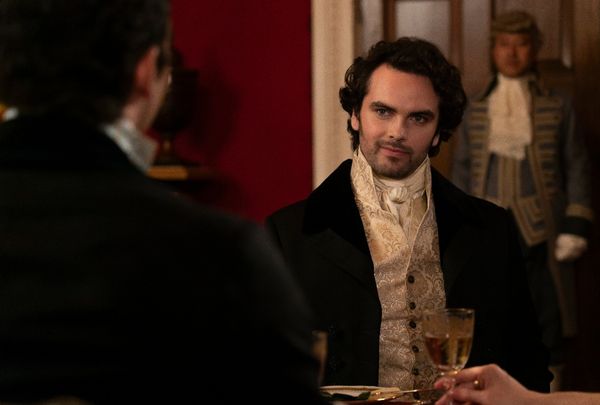 Lucas Aurelio as Paul Suarez in "Bridgerton" (Netflix) (Netflix)That changed completely with the last two episodes of this season. Some of it was previewed before the midseason’s monthlong hiatus when Benedict Bridgerton (Luke Thompson) met the unconventional and free-spirited Lady Tilley Arnold (Hannah New).
Lucas Aurelio as Paul Suarez in "Bridgerton" (Netflix) (Netflix)That changed completely with the last two episodes of this season. Some of it was previewed before the midseason’s monthlong hiatus when Benedict Bridgerton (Luke Thompson) met the unconventional and free-spirited Lady Tilley Arnold (Hannah New).
Lady Tilley isn't like other women, and Benedict soon discovers she isn’t courting him exclusively. When her other male suitor (Lucas Aurelio) desires Benedict too, the second-eldest Bridgerton son soon realizes the feeling is mutual.
But the real jolt emerged in the wake of Francesca Bridgerton’s (Hannah Dodd) quiet wedding with John Stirling, the Earl of Kilmartin (Victor Alli), sealed with a kiss that, from the look on her face, did not rock her world.
Not in the way she lost her ability to speak at the end of the eighth episode, “Into the Light,” when his cousin Michaela Kilmartin (Masali Baduza) introduces herself at the season-ending Dankworth-Finch ball, the to-do to end all to-dos hosted by Penelope’s idiot sisters and secretly funded by the her largesse as the as-yet unmasked Lady Whistledown. The sight of Michaela leaves Francesca visibly flustered in the way of someone surprised by what they're feeling and unsure of what to do with that information. Is this what Genevieve was talking about?
“There is so much in society that is unnatural, but a feeling between two people, whatever their sex, is the most natural thing in the world.”
Not specifically. When Genevieve encourages Penelope to embrace her true self, she is counseling a conflicted woman who loves her avocation as much as her future husband wishes that she'd give it up. Nevertheless, that line is one of many signposts indicating the show’s intent to branch out ideologically and geographically.
Eloise Bridgerton (Claudia Jessie) resolves a season spent moaning about the limited options for women by choosing to see more of the world by joining Francesca and John in Scotland. She realizes her future rests with helping people, she says, and she can't do that without seeing more of the world. Lord Kilmartin's castle is massive enough for him and Francesca to have privacy while his wife's older sister kicks around the Highlands.
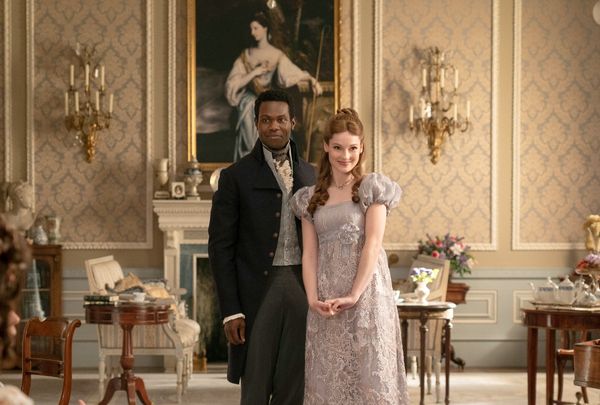 Victor Alli as John Stirling and Hannah Dodd as Francesca Bridgerton in "Bridgerton" (Netflix)That’s also distant enough, perhaps, for Francesca to pursue whatever honest feelings toward Michaela are stirring in her. Julia Quinn’s readers know that Michaela’s character doesn’t technicallyy exist in her "Bridgerton" novels – but there is a Michael Kilmartin who figures prominently in Francesca’s future. That change doesn’t merely pique our curiosity. It explains why the third season devoted so much space to a love story that was tender but forgettable.
Victor Alli as John Stirling and Hannah Dodd as Francesca Bridgerton in "Bridgerton" (Netflix)That’s also distant enough, perhaps, for Francesca to pursue whatever honest feelings toward Michaela are stirring in her. Julia Quinn’s readers know that Michaela’s character doesn’t technicallyy exist in her "Bridgerton" novels – but there is a Michael Kilmartin who figures prominently in Francesca’s future. That change doesn’t merely pique our curiosity. It explains why the third season devoted so much space to a love story that was tender but forgettable.
We need your help to stay independent
Now we know that was always the intent. Besides, injecting Francesca's romance with additional spice might have distracted from Penelope’s arc, the most enthralling of the series so far.
At first it seems like Penelope is getting not simply what she wants, but more than she expected in all ways . . . except the one that matters most. Despite Colin’s fury at her hiding her identity as Lady Whistledown, he resolves to move forward with their marriage as a man of honor. Following through also brings potential damage to his family name; even Queen Charlotte (Golda Rosheuvel) has it out for Lady Whistledown, offering a bounty for her unmasking.
But “Bridgerton” is steadfast about delivering happy endings for its principal characters. Penelope and Colin find their way back to each other, but with him meeting her where she is instead of demanding she accommodate his insecurities.
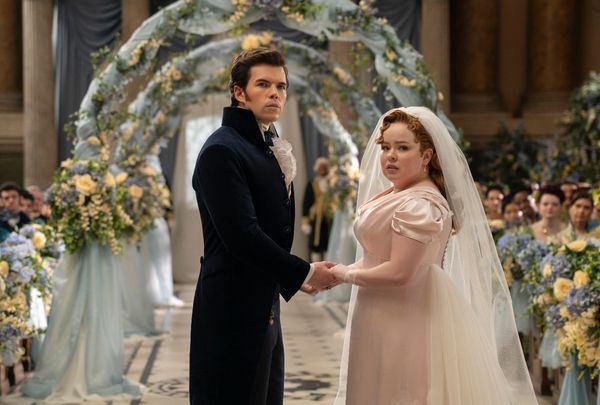 Luke Newton as Colin Bridgerton and Nicola Coughlan as Penelope Featherington in "Bridgerton" (Netflix)Additionally confirming this fairy tale resolution to be that of the woman who can have and do it all, Season 3 closes with a year’s leap forward, when Penelope and her sisters have all produced children. But it is Penelope who delivers salvation to the Featheringtons by giving birth to a son, providing a male heir to inherit the family’s fortune and title. Ergo, Lady Portia Featherington (Polly Walker) can keep all her nice things.
Luke Newton as Colin Bridgerton and Nicola Coughlan as Penelope Featherington in "Bridgerton" (Netflix)Additionally confirming this fairy tale resolution to be that of the woman who can have and do it all, Season 3 closes with a year’s leap forward, when Penelope and her sisters have all produced children. But it is Penelope who delivers salvation to the Featheringtons by giving birth to a son, providing a male heir to inherit the family’s fortune and title. Ergo, Lady Portia Featherington (Polly Walker) can keep all her nice things.
Penelope, with a little help from Agatha Danbury (Adjoa Andoh), additionally salvages her family’s reputation by sacrificing her anonymity at the Dankworth-Finch ball. All this leaves the previously written-off wallflower in the position of one of the ‘Ton's most influential voices, and one of the few women with enough wealth to fend off a solicitor set on tossing Portia out on the street.
Sadly, Penelope's abandonment of her pseudonym may also mean Julie Andrews’ tart voiceover narration is no more. We’ll miss that much more than mean girl Cressida Cowper (Jessica Madsen), whose time in London has also ended. Cressida's failed attempts at assuming Lady Whistledown’s identity and blackmailing Penelope culminate in her banishment to the countryside to live with a hard-hearted aunt.
“Bridgerton” is steadfast about delivering happy endings for its principal characters.
Even this close call inspired growth in Penelope, though. In exchange for retaining her power and influence, she pledges to use her pen with more care and responsibility. By extension, so do “Bridgerton” writers in broadening their adaptation’s definition of inclusion. Benedict's subplot and Francesca's, perhaps, reveal the show's intent to validate all types of relationships in its period piece fantasy. Love is not finite, the writers remind us . . . through Benedict, who says this to Eloise.
Speculations about Benedict’s potential queerness made some viewers wonder if the series would ever explore that that possibility. As the most libertine of the namesake family, he seemed ripest to take that chance. Eventually he proves that theory was onto something by taking part in a two-man threesome in the seventh episode.
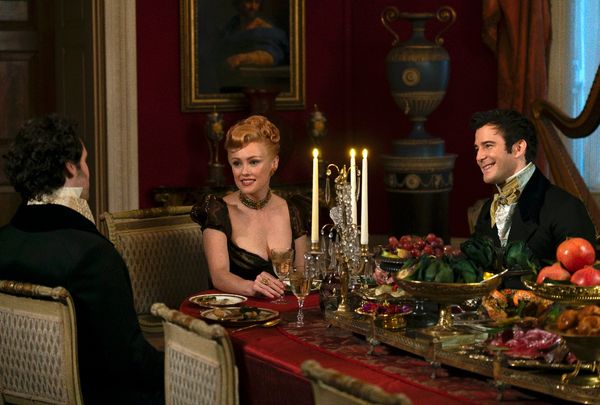 Lucas Aurelio as Paul Suarez, Hannah New as Lady Tilley Arnold and Luke Thompson as Benedict Bridgerton in "Bridgerton" (Netflix) (Netflix)Obviously, none of these developments mean “Bridgerton” has abandoned its usual irresistibility. It’s the opposite. The lavish settings, opulent costumes, and other visual treats are as enchanting as ever. Every "Bridgerton" season promises a wedding. This time we got two. But if it's true that a life of privilege and luxury eventually grows dull (as so many of us have been told), expanding the show's view of romance and love beyond the same old heteronormative pairings shakes up the structure.
Lucas Aurelio as Paul Suarez, Hannah New as Lady Tilley Arnold and Luke Thompson as Benedict Bridgerton in "Bridgerton" (Netflix) (Netflix)Obviously, none of these developments mean “Bridgerton” has abandoned its usual irresistibility. It’s the opposite. The lavish settings, opulent costumes, and other visual treats are as enchanting as ever. Every "Bridgerton" season promises a wedding. This time we got two. But if it's true that a life of privilege and luxury eventually grows dull (as so many of us have been told), expanding the show's view of romance and love beyond the same old heteronormative pairings shakes up the structure.
Want a daily wrap-up of all the news and commentary Salon has to offer? Subscribe to our morning newsletter, Crash Course.
And it also adds real tension and danger, since this era holds stark legal consequences for same-sex pairings beyond the usual obstacles related to potential ruin and disgrace, adding valor and preciousness to whatever plots the writers spin.
Then again, Lady Violet (Ruth Gemmell) may also get lucky in love next season courtesy of Lady Danbury’s handsome brother Lord Anderson (Daniel Francis). The world is smitten with this show, but we’re also soft for “The Golden Bachelor” and “The Golden Bachelorette.”
“There is so much in society that is unnatural,” Lady Tilley says, “but a feeling between two people, whatever their sex, is the most natural thing in the world.” Benedict takes in that message when he tells his younger sister that whatever he learns henceforth “may change me entirely.”
That's reason enough to be excited for whatever future “Bridgerton” maps for him, Francesca and anyone else worth talking about in Lady Whistledown’s column.
All episodes of "Bridgerton" are streaming on Netflix.
Read more
about "Bridgerton"


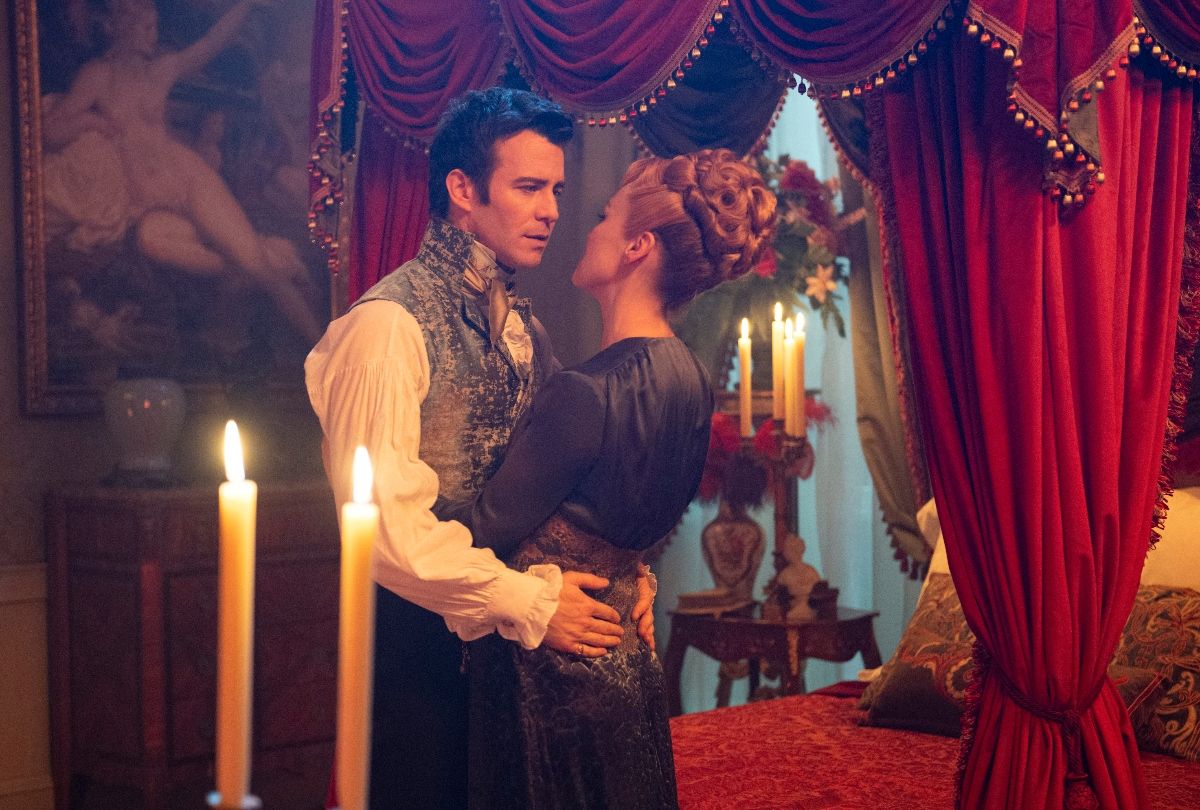
Shares